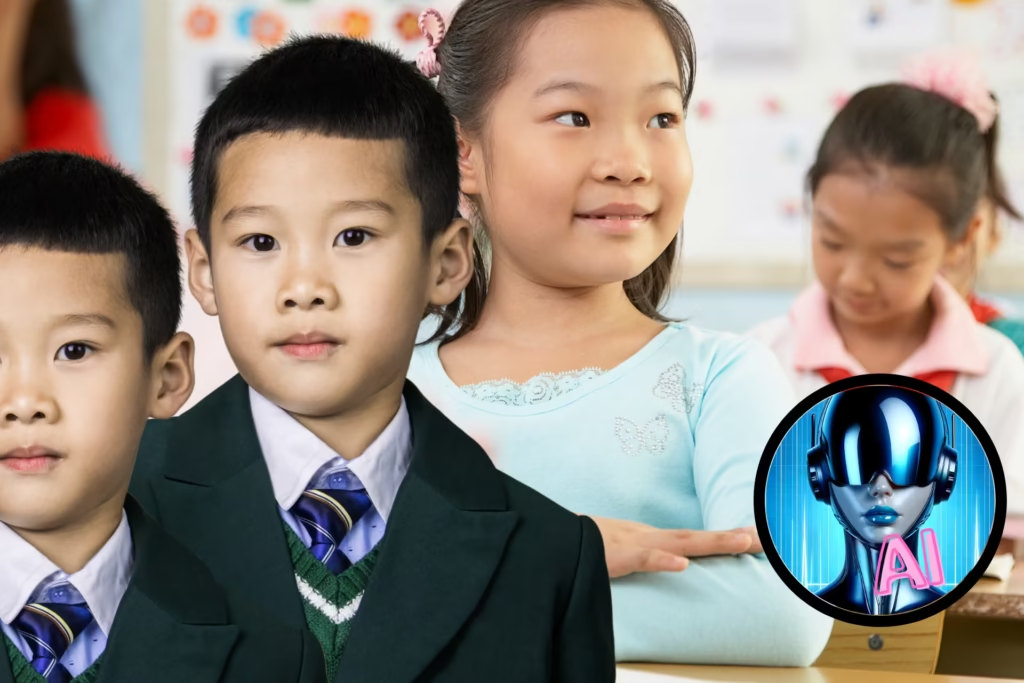As artificial intelligence (AI) rapidly transforms economies and societies, governments worldwide are moving to embed AI education into school curricula-some making it mandatory.
China and the United States are at the forefront of this shift, with other countries also launching ambitious initiatives. Here’s a summary of the latest developments and what they mean for the future of education.
Even if China and the US are in the race for the “pioneering” of AI school, it is actually Hong Kong who first made it mandatory at school since 2023.
China: Mandatory AI Education for All Students

Again, China is the leader in this technology learning!
Starting September 1, 2025, China will require AI education in all primary and secondary schools, reaching children as young as six years old.
The policy mandates at least eight hours of AI lessons per year for every student. The curriculum is age-tailored:
-
Primary students: Hands-on, practical sessions introducing basic AI concepts and robotics
-
Middle school: Everyday applications of AI, algorithmic thinking, and real-world problem-solving
-
High school: Advanced topics like machine learning, robotics, and innovation projects
Schools can integrate AI into STEM subjects or offer standalone classes. China’s Ministry of Education will soon release a comprehensive white paper to guide nationwide implementation.
The move is part of a broader national strategy to build a future-ready, tech-literate workforce and cement China’s leadership in AI innovation.
Education experts call it a “game-changer,” putting AI literacy on par with reading and mathematics.China is taking a bold step in education by making AI classes mandatory for all students aged six and up, starting September 1, 2025. Every student will receive at least eight hours of AI instruction each year, either as standalone courses or integrated into subjects like science and IT.
The curriculum is tailored to different age groups:
-
Primary School: Young learners will engage in hands-on activities to grasp basic AI concepts and robotics.
-
Middle School: Students will explore how AI applies to everyday life, enhancing their problem-solving skills.
-
High School: Teens will delve into advanced topics like machine learning and undertake innovation projects.
This initiative is part of China’s broader strategy to cultivate a tech-savvy workforce and solidify its position as a global leader in AI innovation. Education experts are calling it a “game-changer,” placing AI literacy on par with reading and mathematics.
To support this rollout, the Ministry of Education plans to release a comprehensive white paper in 2025, providing guidance for nationwide implementation.
United States: Federal Push for AI in K-12 Schools

In April 2025, the White House took a significant step by issuing an executive order titled “Advancing Artificial Intelligence Education for American Youth.”
This initiative aims to enhance AI literacy and proficiency among students and educators across the United States.
Key components of the executive order include:
Establishing a White House Task Force on AI Education: This task force is responsible for coordinating federal efforts to integrate AI into K-12 education nationwide.
Launching the Presidential AI Challenge: A nationwide competition designed to encourage and showcase student and educator achievements in AI, promoting innovation and collaboration across sectors.
Prioritizing AI in Education Grants: Federal agencies are directed to prioritize AI-related initiatives in discretionary grant programs, fellowships, and scholarships, particularly focusing on teacher training and curriculum development.
Supporting Public-Private Partnerships: The order encourages collaborations between government, academia, and industry to develop AI curricula, provide teacher training, and create online resources for AI education.
While AI education is not yet universally mandatory across all U.S. schools, this executive order represents a significant policy shift towards integrating AI into the educational landscape.
The overarching goal is to prepare American students for an AI-driven workforce and to maintain the nation’s leadership in technological innovation.
Additionally, over 200 CEOs from major companies, including Microsoft, Uber, and LinkedIn, have signed a letter urging state leaders to make computer science and AI mandatory graduation requirements in high schools.
This collective advocacy underscores the growing recognition of AI’s importance in education and the workforce.

Global AI Education Initiatives in other countries
South Korea: Starting in March 2025, South Korea is introducing AI-powered digital textbooks for grades 3, 4, 7, and 10, covering subjects like English, math, information, and Korean for special education. The plan is to expand this rollout to additional subjects, including social studies and science, with full implementation across all schools by 2028. This initiative is accompanied by significant investments in teacher training and digital infrastructure.
United Arab Emirates (UAE): The UAE is making AI education mandatory from kindergarten through Grade 12 in public schools, starting in the 2025–26 academic year. The curriculum includes teaching critical thinking, ethical AI use, writing effective prompts, and avoiding plagiarism. Teachers have been upskilled through collaborations with institutions like the Mohamed bin Zayed University of AI and the Emirates College for Advanced Education.
Australia: In December 2023, Australian Education Ministers approved the Australian Framework for Generative Artificial Intelligence in Schools. This framework provides guidance on understanding, using, and responding to generative AI in Australian school-based education, aiming for a phased adoption with pilot programs.
Estonia: Estonia has launched the AI Leap 2025 program to integrate cutting-edge AI applications into its education system. This initiative provides students and teachers with access to AI-based educational tools and emphasizes digital skills and ethical AI use. Estonia’s approach builds on its history of integrating technology into education, aiming to enhance learning and teaching through AI.
Finland: Finland offers the “Elements of AI” course, developed by the University of Helsinki and Reaktor. This free online course introduces fundamental AI concepts and ethics, aiming to educate a broad audience regardless of their background. The course has been widely adopted and translated into multiple languages, reflecting Finland’s commitment to AI literacy.
Hong Kong: Since the 2023–24 academic year, Hong Kong has mandated 10 to 14 hours of AI education for junior secondary students (Form One to Three). The curriculum includes lessons on basic AI concepts, computer vision, speech and language understanding, robotic reasoning, AI ethics, and social impacts.
Conclusion
China’s sweeping mandate and the US’s federal initiatives reflect a new era in global education policy-one where AI literacy is becoming as fundamental as reading and math. As more countries follow suit, the race is on to prepare the next generation for an AI-powered world.
Why This Matters ?
Countries recognize AI literacy as essential for preparing students for future job markets increasingly influenced by AI technologies.
Early exposure to AI aims to bridge digital divides and inspire interest in STEM careers among diverse student populations.
Not only for nations like China, the UAE, or the US, integrating AI education is a strategic move to foster technological sovereignty and drive national development.
If you’re exploring ways to broaden your children perspectives during their scholarship, and minimize your tax burden in any way (income, investment, business setups, …), BanTheTax is here to guide you.
Send us an email at info@banthetax.com.
We are eager to hear from you!
Thank you for subscribing to our Newsletter and to our Youtube channel! We appreciate your support.
